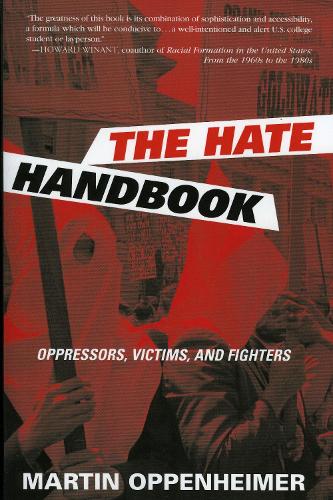
The Hate Handbook: Oppressors, Victims, and Fighters
(Paperback)
Publishing Details
The Hate Handbook: Oppressors, Victims, and Fighters
By (Author) Martin Oppenheimer
Bloomsbury Publishing PLC
Lexington Books
12th October 2005
United States
Classifications
Tertiary Education
Non Fiction
303.6
Physical Properties
Paperback
128
Width 166mm, Height 228mm, Spine 12mm
200g
Description
Why, in this supposedly rational, early twenty-first century, do large groups of people hate other groups of people and murder them wholesale Pick up the paper any day of the week: Terrorists, torturers, mass murderers in and out of uniform, extremists of all nationalities, races, ethnic groups, and religions. How do such people justify their violence What motivates them What social conditions contribute to climates of hatred How do those victimized by bigotry fight back In The Hate Handbook: Oppressors, Victims and Fighters Martin Oppenheimer sets out to answer these questions in clear, conversational, and at times shockingly frank prose. Oppenheimer focuses on cases in recent history, from incidents of police brutality to Nazi executions, from wartime aerial bombing to suicide bombers, in order to shed sociological and psychological light on the behavior of both perpetrators and victims. Heralded by many as a terrific book for the layman and scholar alike, The Hate Handbook is an important core text for sociology, social psychology, history and political science courses, especially those focusing on minorities, conflict and social movements.
Reviews
Hate crimes are among our most difficult public policy issues. While all of us agree that violence motivated by group hatred should be condemned, few us have suggestions on how it should be addressed. Martin Oppenheimer has written a serious book. As important as its sobering substance, however, is the foundation it offers for developing effective remedies. -- Frank H. Wu, Dean, Wayne State University Law School
The greatness of the book is its combination of sophistication and accessibility, a formula which will be conducive to widespread course adoptions....SOCIOLOGICALLY, Oppenheimer provides well-grounded accounts of social stratification, of the modern state, of discrimination, and of intersection of race and class and gender and sex....Perhaps the most important promise of this book is that such people can be CALLED BACK to their humanity and decency, helped to understand that they are not attitudinally consolidated as "haters," as fearful people, as racists. They can be educated to understand how much they are actually like "the others," and how deep their commitments to democracy and freedom actually run. Creating the possibility of that recognition, that realization, is Marin Oppenheimer's great accomplishment here. -- Howard Winant, director, Center for New Racial Studies, University of California Santa Barbara; author, The World Is A Ghetto: Race and Democracy Since World War II
Author Bio
Martin Oppenheimer is author ofThe State in Modern Society and The Urban Guerrilla
